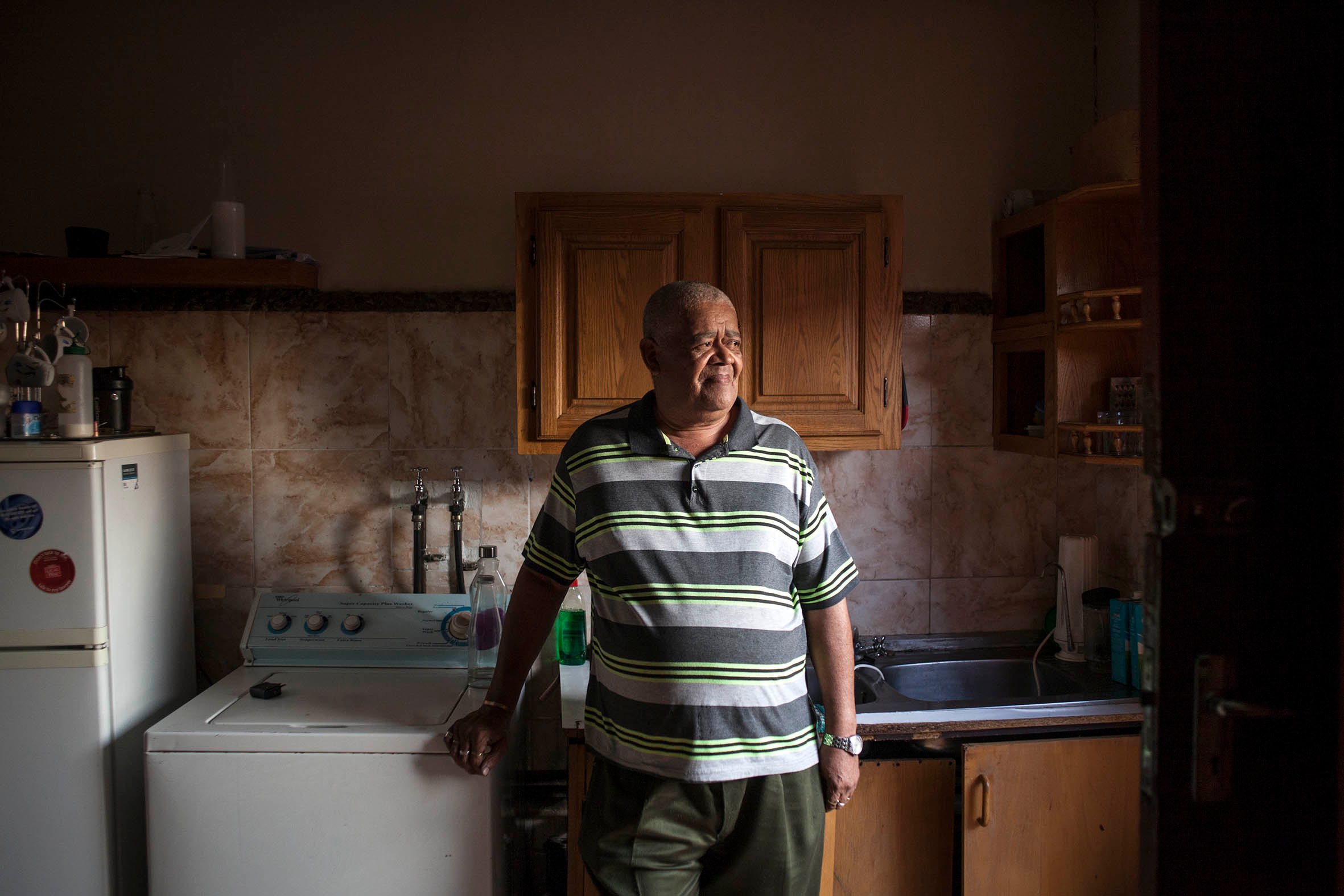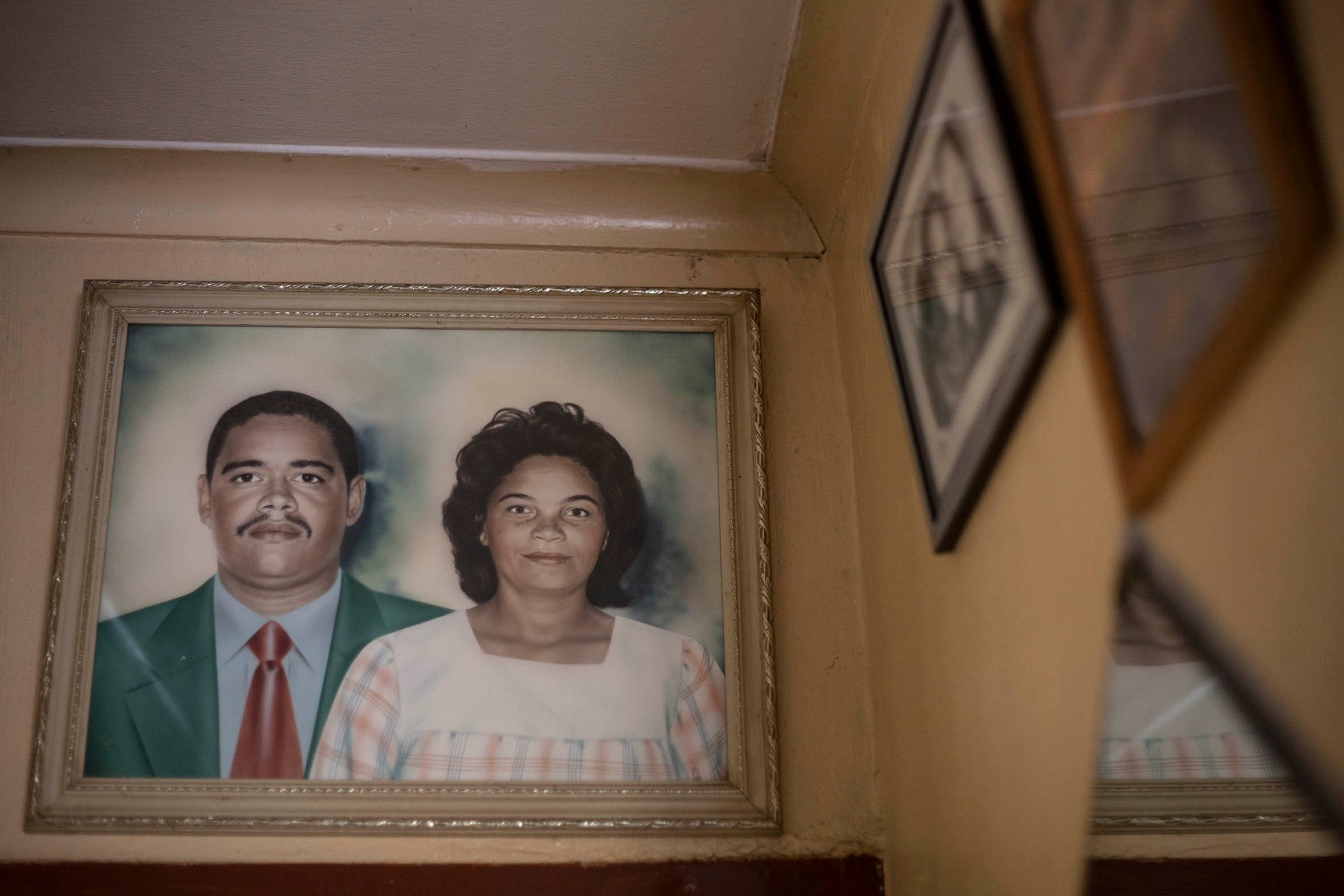Natalie Lewis believes if the health department investigated her mother's death this could have prevented 180 people from dying from listeriosis.
It was just after midnight, on his 58th birthday, when Ronnie van Neel woke up. The 12 metrical gongs of the grandfather clock in the lounge were about to end.
Outside, the streets of Eldorado Park in the south of Johannesburg had faded to a low hum. Only the two dogs in the backyard could be heard shuffling around.
It was Monday December 12 2016.
Inside Van Neel’s bedroom there was trouble. His wife Sandra was sprinting to the bathroom. She had severe diarrhoea and was vomiting profusely.
The three grandchildren who stayed with the couple were asleep. But they, too, had experienced stomach problems in the previous weeks.
Ronnie placed his hand on Sandra’s forehead. She was boiling hot. “I looked at Sandra and jokingly said: ‘Are you giving me vomit for my birthday?’ ” he remembers. “But I was incredibly worried.”

Grieving: Ronnie van Neel still hasn’t come to terms with losing his wife, Sandra, to listeriosis in late 2016. (Oupa Nkosi)
Within two days, Sandra could do hardly anything for herself. “My mother couldn’t walk, eat, talk or stand up,” Sandra’s daughter, Natalie Lewis, recalls. “She was also confused and said things that don’t make sense.”
Two of the three grandchildren who stayed with Ronnie and Sandra were Natalie’s children.
“My mother loved Rainbow Simply Chicken Premium Polony. If you came here in this house, you always found a roll of it in the fridge.”
Sandra had for months “complained about having diarrhoea and said her stomach was paining”, Lewis says. “But we took this for granted. We thought it’s just a sore tummy. Just like with the kids.”
Later that morning after Sandra had started to vomit, Lewis tested her mother’s sugar levels. Normal blood glucose levels are between 3.9 and 5.5mmol/L, according to the medical research organisation Mayo Clinic. Sandra’s was three times higher. Diabetes weakens people’s immune systems, making them more susceptible to infectious diseases.
Sandra was admitted to Charlotte Maxeke Johannesburg Academic Hospital that afternoon. Doctors diagnosed her with meningitis. “The doctor said he was running more tests to establish the cause,” Lewis says.
On that Wednesday, Sandra’s diagnosis was out: the results showed she had listeriosis, the disease that the National Institute for Communicable Diseases (NICD) says has recently led to the deaths of 180 people in South Africa.
Four days later, at 5am on the Sunday, the hospital called Lewis. “I saved the number on my phone because I was calling so often. When I saw the caller ID, I froze,” she says. “I answered and a nurse told me my mother had died. They said nothing else except that.”

A painting of Ronnie and Sandra van Neel hangs in the couple’s home. (Oupa Nkosi)
Sandra van Neel’s insurance death claim forms state that her “immediate cause of death” was “sepsis” as a result of “listeria meningitis”.
The listeria bacterium is found in food, often in cold meat. The germ can cause blood poisoning or bacterial meningitis, a potentially deadly inflammation of the tissues surrounding the brain and spinal cord, particularly in people with weak immune systems like Sandra, according to the Mayo Clinic.
On March 4 this year, the NICD confirmed that Enterprise polony from the company’s Polokwane factory was the source of the listeriosis outbreak. Polony products from a Rainbow Chicken Limited facility have also been linked to the bacterium — the same polony Sandra loved so much.
Back in December 2016, the family was planning Sandra’s funeral when environmental health officials called to ask Ronnie what his wife had eaten.
“My dad said: ‘Why are you asking me this now? Why didn’t you do your jobs and keep her alive in the hospital?’
“We didn’t understand why the inspectors were calling and they also didn’t explain why it was important for us to tell them what my mother ate. They never called my father again.”
[multimedia source=”http://bhekisisa.org/multimedia/2018-03-07-video-how-to-clear-your-fridge-of-listeria”]
Ronnie and Lewis’s trauma didn’t end with Sandra’s death.
On Monday this week, their two-year-old second cousin died of the disease. The child’s four-year-old sibling was released from an intensive care unit earlier this week — he also had been admitted with listeriosis.
“The family is far too devastated to talk about this,” Lewis sobs.
The pictures of the Van Neels’s 13 grandchildren decorate the walls of their grandfather’s house.
“I got so angry when I saw the minister on television talking about listeriosis because this has been happening for years. Some of the other patients in my mother’s ward also had listeriosis — already in December 2016,” Lewis says.
“Had the health department or the hospital sent out health inspectors, they could have done those tests far earlier. They could have prevented 180 people from dying.”
She softly continues: “They would have found polony in this house. They would have found listeriosis somewhere in the fridge.”
This week Health Minister Aaron Motsoaledi warned that municipalities often don’t want to spend their resources to hire environmental health practitioners.
Above the TV in the lounge is a portrait of Ronnie and Sandra on their 35th wedding anniversary. Sandra is wearing a wedding dress.
Lewis explains: “My parents got married in court, but she always wanted a wedding. For their 35th anniversary we had a celebration and she wore that dress. We bought it for her. It was her first wedding dress.”
Lewis removes the picture from the wall and goes to sit on a maroon couch in the corner of the room. She grips the portrait tightly with both hands and says: “My mom always wanted to be a bride, so we buried her in her wedding dress and shoes.”